Huntsville: Death Capital
KIM LAWTON, guest anchor: Across the country, more than 3,000 inmates are on death row waiting to be executed or reprieved. So far this year (2007), nine executions have taken place in America, eight of them in Texas, which for several years now has executed more prisoners than any other state. All executions in Texas occur in one place — Huntsville. Lucky Severson went there and filed this report.
LUCKY SEVERSON: Cemeteries are always lonely places, and this is one of the loneliest. Most of the men and women buried here were executed by the state of Texas, and apparently no one in their family wanted to claim the body. The number of headstones reflects the fact that Texas has executed more prisoners than any state in the nation. What can’t be buried here is the profound pain that has ruined so many lives.
Chaplain Richard Lopez ministered to dozens of men on death row, watched them die, and then conducted their funerals. He believes that eight out of 10 repent before they meet their maker.
Chaplain RICHARD LOPEZ: I have felt more useful as a servant of God ministering to those men than anything I have done in my life. I believe that I have been able to bring them hope, to bring them peace that God has given me in my life.
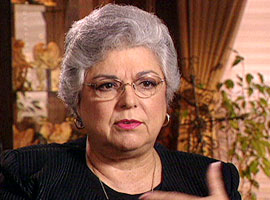 SEVERSON: Paula Kurland says she couldn’t have made it through the last 17 years without God holding her hand, and even then the pain from the brutal murder of her daughter never goes away.
SEVERSON: Paula Kurland says she couldn’t have made it through the last 17 years without God holding her hand, and even then the pain from the brutal murder of her daughter never goes away.
PAULA KURLAND: (Mother of Murder Victim): Mitzi was murdered in Austin, Texas, September 13, 1986 on her 21st birthday. Mitzi’s roommate was stabbed 14 times, and her throat was slit twice and Mitzi was stabbed 28 times and it was so violent that he fought her all the way back into her bedroom and into her closet and she died in a fetal position. I literally died, I was a walking dead person. My children lost their sister and their mother in one night. They’re just now getting their mother back. They will never get their sister back.
SEVERSON: The Huntsville First Baptist Church is located directly across the street from the building known as the walls unit, where Texas executes the condemned by lethal injection. The church ministers to victim’s families, inmates families, and prison guards. It is a calling the church takes very seriously.
Pastor DAVID VALENTINE (Huntsville First Baptist Church): You know in Ezekiel, it says, “The soul that sins shall die.”
SEVERSON: Pastor David Valentine says his congregation is compassionate, but strongly pro-death penalty.
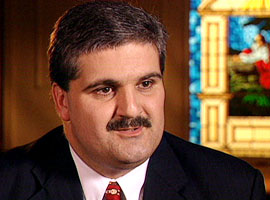 Pastor VALENTINE: We need to understand the concept from scripture of individual responsibility. Revenge is if I hurt someone in your family and you come after me to hurt me back. That’s revenge. Justice is when a third party intervenes and implements judgment according to the law. We are not to be the revenge people but to allow God through government to avenge the death through justice.
Pastor VALENTINE: We need to understand the concept from scripture of individual responsibility. Revenge is if I hurt someone in your family and you come after me to hurt me back. That’s revenge. Justice is when a third party intervenes and implements judgment according to the law. We are not to be the revenge people but to allow God through government to avenge the death through justice.
SEVERSON: Like the church, the town is overwhelmingly pro capital punishment, something like 78 percent. According to a Gallup survey, nationwide 72 percent favor the death penalty, down from a few years ago.
Almost half of those polled said they support capital punishment because of the biblical reference to an “eye for and eye.” But scholars say an “eye for an eye” was actually instituted as a measure of leniency — that the punishment should fit the crime.
Pastor VALENTINE: My understanding is the culture, 1000 years ago, that if you did a crime against me or my government, what I would do is not only eliminate you, but your family as punishment, and this “eye for an eye” what that did was to limit how far retribution or justice could go.
SEVERSON: Huntsville district attorney David Weeks grew up a pacifist opposed to capital punishment. But he says he has learned that some people are different — that some are natural born predators.
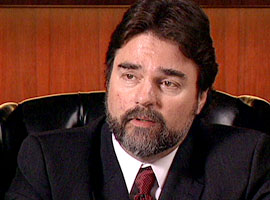 DAVID WEEKS (District Attorney, Huntsville, Texas): They send me Christmas cards, but I hope they never get out of prison.
DAVID WEEKS (District Attorney, Huntsville, Texas): They send me Christmas cards, but I hope they never get out of prison.
SEVERSON: He says he’s tried 10 death penalty cases, but he doesn’t always push for the maximum punishment.
Mr. WEEKS: The death penalty ought to be confined to the worst of the worst. There are some crimes, some individuals who are so outside the bounds that you have to draw the line someplace. You have to have the ultimate punishment to make the rest of the punishments work.
SEVERSON: And he believes the death punishment deters homicides.
Mr. WEEKS: I believe it’s a deterrent. I believe it’s a necessary part of the criminal justice system that when the crime or the individual is so bad that the ultimate penalty has to be there.
SEVERSON (to Emmett Solomon): You don’t think capital punishment is a deterrent?
EMMETT SOLOMON (Former Death Row Chaplain): No, capital punishment is a deterrent for that person, but it’s not a deterrent in terms of reducing crime. Actually crime rates generally run a little higher where they do have capital punishment.
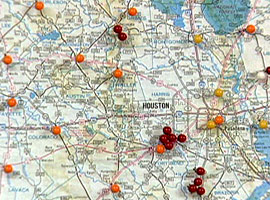 SEVERSON: Emmett Solomon is a former death row chaplain, who has devoted his life to healing. There’s a lot to be done. Look at his map. Each pin represents a prison or jail. There are 210 in Texas; 150,000 inmates — 438 men, eight women on death row.
SEVERSON: Emmett Solomon is a former death row chaplain, who has devoted his life to healing. There’s a lot to be done. Look at his map. Each pin represents a prison or jail. There are 210 in Texas; 150,000 inmates — 438 men, eight women on death row.
Mr. SOLOMON: Society has a right to have the death penalty. What I also think that society is much better off and more mature if it choose not to use it. The only thing they could think of is getting poetic justice, doing the same thing back to that person. But in the end, brutality breeds brutality.
SEVERSON: In a trailer down the road from the prison, Solomon runs a program of restorative justice which he says is based on teachings in the Old Testament about healing, not just the individual, but the entire community.
Mr. SOLOMON: In restorative justice, we ask questions like: “What will it take to bring a sense of peace or shalom back to this community that has been broken by this crime? What would it take to bring a sense of autonomy back to this victim? And what will it take eventually to restore this offender to the community?” Those questions all lead to healing.
SEVERSON: It was healing that Paula Kurland was desperate for when she requested a meeting with her daughter’s killer, Jonathan Nobles, and it finally happened only two weeks before his execution. She says it came after a struggle with God.
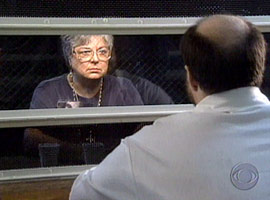 Ms. KURLAND: I felt he was pushing me to do something that I really didn’t want to do — that I should forgive Jonathan. But he let me know that it was in me.
Ms. KURLAND: I felt he was pushing me to do something that I really didn’t want to do — that I should forgive Jonathan. But he let me know that it was in me.
SEVERSON: She met with Nobles for five excruciating hours.
Ms. KURLAND (from segment on 48 HOURS): I never forgive what you did but the God that I believe in demands that I have to forgive you as a person.
JONATHAN NOBLES: I respect that.
Ms. KURLAND: Bye, Jonathan.
Ms. KURLAND: I walked out of death row a new person. I absolutely walked out a new person.
SEVERSON: How do you forgive him but don’t forgive the crime? I don’t understand the distinction.
Ms. KURLAND: All through the Bible it says that God loves the sinner, hates the sin. I didn’t have to forgive what he did I had to forgive him as a person and what I did and it wasn’t easy.
SEVERSON (to Mr. Solomon): Even though you brutally murdered somebody, God is there for you?
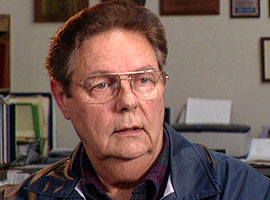 Mr. SOLOMON: Yes, if you will turn to him because the very essence of the Gospel, is that God will show his grace and mercy to you if you turn to him.
Mr. SOLOMON: Yes, if you will turn to him because the very essence of the Gospel, is that God will show his grace and mercy to you if you turn to him.
SEVERSON: Two weeks after Paula met with Jonathan Nobles, he was executed, and she was there.
Ms. KURLAND: He ended up thanking me for the last two weeks of his life because I had given him so much peace. He even told me that he loved me.
SEVERSON: Was this in the execution chamber?
Ms. KURLAND: Yes.
SEVERSON: And she is still in favor of the death penalty.
Ms. KURLAND: I feel that some crimes warrant the death penalty. Some life without the possibility of parole. Jonathan didn’t deserve life, he deserved what he got. The fact that I had forgiven him didn’t change what he had done.
SEVERSON: This evening at six o’clock, Texas will execute its 298th felon since the Supreme Court reinstated the death penalty in 1982. The condemned is a 28-year-old black man, Richard Williams, convicted for the contract murder of a middle aged woman in a wheel chair. The victim had her throat cut and was stabbed repeatedly with a steak knife. The killer was promised more but received only $400 dollars for the murder.
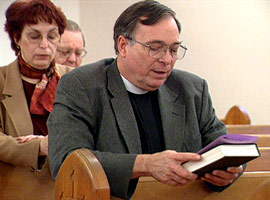 It’s become a ritual, all too common — a liturgy at St. Stephens Episcopal Church minutes before an execution.
It’s become a ritual, all too common — a liturgy at St. Stephens Episcopal Church minutes before an execution.
Unidentified Priest (at St. Stephens’ execution liturgy): For our brother Richard Ed Williams, for his sincere contrition and his confidence in Jesus Christ. Lord hear our prayer. For his family in their sorrow.
SEVERSON: Outside a small vigil of death penalty opponents. The victims’ family is inside. Richard Williams, the man to die, apparently has no family.
Unidentified Protestor: I think this is wrong and I would like to see the state stop it.
Unidentified Priest (at St. Stephens’ execution liturgy): For his victim, Jeanette Williams, that she have eternal peace. Lord have mercy.
Unidentified Protestor: When we execute these men you take their chances for redemption away from them.
Unidentified Priest (at St. Stephens’ execution liturgy): For the executioners who represent us. Give them peace.
LARRY FITZGERALD (Prison Spokesman): Williams was taken from his cell at 6:03 this evening. In his last statement he apologized to the victims of the crime. He apologized to his family. He said he was remorseful. He was sorry for all the pain that he had brought both the families. He told the warden he was through. The lethal injection started flowing and he was pronounced dead at 6:19 this evening.
SEVERSON: The state of Texas has scheduled 12 more executions this year, bringing the annual total to 25. So far this year, there have been six stays of execution. For Religion & Ethics NewsWeekly, I’m Lucky Severson in Huntsville, Texas.
ABERNETHY (Dec. 2, 2005): Throughout the U.S. there are now about 3,400 people on death row. Meanwhile, both the number of executions and support for them has been going down slightly. So far this year 56 people have been executed. Over the past several years, the percentage of people approving capital punishment has dropped from the low 70s to the mid-60s.

